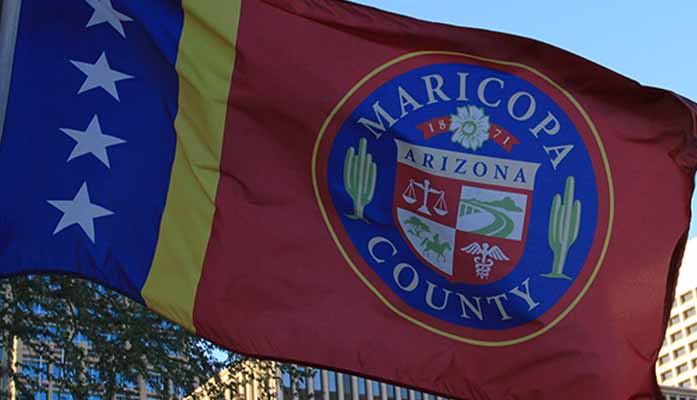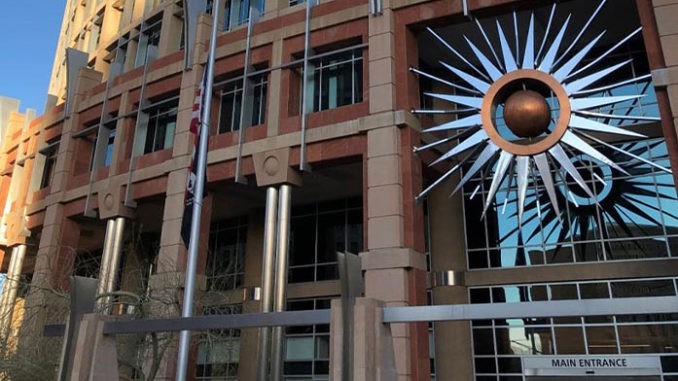
by Jonathan Eberle | Sep 26, 2025 | Economy, News
By Jonathan Eberle |
Arizona’s housing market showed signs of cooling in the second quarter of 2025, but affordability challenges persist, according to a new analysis from the Common Sense Institute (CSI).
CSI’s Q2 Housing Affordability Report highlights a combination of falling home prices, slowing residential permitting, and a continuing housing deficit as factors shaping the state’s housing outlook.
Key findings from the report indicate that Arizona currently faces a housing shortage of 52,846 units, a 6.9% decline from 2024. Analysts say the reduction stems more from weakened buyer demand than from an increase in housing supply.
The average home price in the state remains $426,164—roughly $53,400 (14.3%) above what prices would have been if they had followed pre-pandemic trends. Despite recent price declines, households still need to earn $95,808 annually—or work 64 hours per month at the average wage—to afford a mortgage on the typical home.
The CSI report assigns Arizona a “C-” grade for housing in Q2 2025, noting continued affordability concerns and low permitting levels. Maricopa County maintained its “D” rating, while Pima County improved to a “B.” Residential permitting in Arizona is projected to approve 51,877 units this year, a 12.5% decrease from 2024 and the slowest pace since 2019. Experts note that the state needs between 60,000 and 75,000 new units annually to close the housing gap.
“Arizona’s housing market is cooling, but the relief many hoped for has not materialized,” said Zachary Milne, CSI Senior Economist and Research Analyst. “Prices are still far above pre-pandemic levels, mortgage costs remain burdensome, and new homebuilding is slowing at a time when the state already faces a significant housing deficit. Without a sustained increase in supply, affordability will remain out of reach for too many Arizonans.”
The report concludes that Arizona’s long-term housing challenges are driven by both elevated prices and insufficient construction. While the recent moderation in demand has provided some short-term relief, the underlying supply gap continues to affect affordability across the state.
Jonathan Eberle is a reporter for AZ Free News. You can send him news tips using this link.

by Jonathan Eberle | Sep 25, 2025 | Economy, News
By Jonathan Eberle |
Maricopa County has retained the highest possible credit rating. Standard & Poor’s Global Ratings affirmed its AAA rating with a stable outlook, signaling strong financial health amid broader economic challenges.
County officials say the rating reflects careful fiscal management and a solid economic foundation. According to Chairman of the Board of Supervisors Thomas Galvin, District 2, the AAA rating demonstrates that “Maricopa County is not only financially strong but fiscally responsible.”
The County operates well below its maximum property tax levy and carries no general obligation debt, a distinction rare for large counties. Officials note that these measures help reduce costs for residents while supporting strategic investments in infrastructure and public services.
The AAA rating reflects several factors, including:
- Conservative budgeting and prudent financial management.
- Healthy reserves that protect against economic uncertainty.
- A diverse local economy, with strong employment in government, education, health care, and aerospace.
- Taxpayer protection through levying nearly $270 million below the County’s maximum property tax capacity.
- Absence of general obligation debt, limiting taxpayer liabilities.
Maintaining the AAA rating also allows the County to borrow at lower interest rates, which can save millions of dollars on capital projects such as public safety facilities, technology upgrades, and infrastructure improvements. Officials say these savings benefit residents through enhanced services and lower costs.
The affirmation comes at a time when many counties nationwide face economic pressures, highlighting Maricopa County’s continued focus on long-term fiscal stability.
Jonathan Eberle is a reporter for AZ Free News. You can send him news tips using this link.

by Jonathan Eberle | Sep 22, 2025 | Economy, News
By Jonathan Eberle |
Arizona workers in Yuma and Lake Havasu City-Kingman have seen some of the strongest wage growth in the nation over the past five years, according to a new analysis of Bureau of Labor Statistics data.
The study, conducted by AlgoCademy, reviewed mean hourly wage changes across 395 U.S. metropolitan statistical areas between 2019 and 2024. It found that two Arizona metros ranked in the national top 50 for wage growth.
Yuma placed 11th nationwide, with mean hourly wages climbing from $19.54 in 2019 to $25.74 in 2024—a 31.73% increase. Lake Havasu City-Kingman followed at 26th, where average wages rose from $19.90 to $25.89, a 30.10% increase.
Nationwide, the strongest growth occurred in San Jose-Sunnyvale-Santa Clara, California, where wages jumped 44.29% to an average of $58.25 per hour, reflecting the tech hub’s continued economic strength. Other metros in the top five included Sebring, Florida (up 38.74%), Decatur, Illinois (37.89%), Boulder, Colorado (37.84%), and Bellingham, Washington (37.10%).
AlgoCademy’s founder and CEO, Mircea Dima, noted that the findings highlight a broad trend: wage growth is not confined to large urban centers. “Smaller and mid-sized areas like Grants Pass, Oregon, Modesto, California, and Logan, Utah are all seeing wage increases above 34%, showing that opportunities for higher earnings are spreading beyond major U.S. cities,” Dima said. “These trends are a clear sign that workers across the country are benefitting, which can have a positive effect on local communities, from boosting spending power to attracting new talent and investment.”
The research underscores that wage gains have been widespread. While high-growth areas like Silicon Valley continue to dominate in raw numbers, smaller regions—including several in Arizona—are seeing wages rise at a pace that outstrips many larger metropolitan areas. Arizona’s results put the state in strong company, showing that even outside its largest metros, wages have grown substantially since 2019.
Jonathan Eberle is a reporter for AZ Free News. You can send him news tips using this link.

by Jonathan Eberle | Sep 17, 2025 | Economy, News
By Jonathan Eberle |
Arizona residents could collectively lose millions of dollars to fake gambling websites this fall, according to a new study analyzing Federal Trade Commission (FTC) scam reports. The report, conducted by online gaming marketplace Chicks Gold, found that Arizona consumers reported $7.9 million in losses between April and June of this year from scams linked to fake gambling and gaming sites. Analysts warn those numbers could rise sharply as the NFL season, the most bet-on sport in the United States, fuels a wave of online wagering.
“Scammers know there’s likely to be a surge in inexperienced bettors searching online for wagering platforms,” said Al Alof, CEO of Chicks Gold and spokesperson for the study. “That makes them especially vulnerable to fake sportsbooks or offers that appear too good to be true.”
The study examined scams across five FTC subcategories connected to fraudulent gambling platforms: malware and exploits, online shopping, tech support, social networking, and prizes, sweepstakes, and lotteries. Nationally, 106,531 reports were filed in Q2, totaling nearly $192 million in losses, or an average of $1,965 per report. Arizona’s losses were significantly higher: 2,830 reports led to nearly $7.95 million stolen, averaging $2,811 per report—43% higher than the national average.
The most damaging category for Arizona residents was prizes, sweepstakes, and lotteries, which accounted for $4.1 million lost across just 408 reports, averaging more than $10,000 per incident. That placed Arizona sixth in the nation for per-report losses linked to these types of scams, behind Montana, Maine, South Dakota, Wyoming, and North Dakota.
According to the study, fraudulent gambling and gaming operations exploit consumers in several ways:
- Malware and exploits: Fake casino sites that prompt users to download spyware disguised as “mods” or “cheat tools.”
- Online shopping scams: Fake sites selling in-game items, currency, or memberships that never arrive.
- Tech support fraud: Pop-ups or sham help desks convincing players to share sensitive information.
- Social networking scams: Fake or hijacked profiles distributing phishing links in gaming communities.
- Prizes, sweepstakes, and lotteries: Lures promising jackpots or loot boxes that require upfront payment or personal data.
“These scams thrive on community and urgency,” Alof said. “Gamers searching for new releases or fans eager to place bets can be tricked into handing over money or sensitive information.” The rise in gambling scams has also been noted by the Better Business Bureau (BBB), which reports that complaints about online gambling platforms more than doubled since 2023. Users described problems ranging from malfunctioning slot games and altered wagers to deceptive ads and phishing attempts.
To protect themselves, Alof urged consumers to:
- Verify licensing and URLs: Legitimate sportsbooks are licensed by state regulators. Misspelled domains or unofficial app stores are red flags.
- Avoid unrealistic offers: “Guaranteed wins” or oversized bonuses are often bait for scams.
- Use secure payments: Credit cards or PayPal provide better protection than wire transfers or gift cards. Enabling two-factor authentication also reduces risk.
Analysts caution that both sports bettors and traditional gamers face exposure. Beyond the NFL betting surge, Alof noted that the release of popular video games creates another avenue for fraud. When legitimate gaming sites crash under demand, players may turn to unverified download links, which scammers exploit. With Arizona already posting losses above the national average, experts warn vigilance will be crucial in the months ahead.
Jonathan Eberle is a reporter for AZ Free News. You can send him news tips using this link.

by Jonathan Eberle | Sep 16, 2025 | Economy, News
By Jonathan Eberle |
According to a new report from the Common Sense Institute (CSI), inflation in the Phoenix metro area rose 1.4% year-over-year in August, as measured by the Consumer Price Index (CPI). The increase marks a climb from June’s 0.8% reading and ends a four-month stretch where local inflation hovered below 1%.
As noted by the report, the uptick comes as Arizona’s economy shows signs of slowing, with weaker job growth and a cooling housing market. Still, compared with much of the nation, inflation in Phoenix remains subdued. Among the 23 metro areas tracked monthly, Phoenix ranked 20th in year-over-year price growth, continuing a dramatic reversal from 2022 and 2023, when the region routinely topped the list for fastest-rising prices.
Nationally, inflation picked up in August, rising 2.9% from a year earlier after holding steady at 2.7% in the prior two months. Prices across the country have now exceeded the Federal Reserve’s 2% target for more than two years.
Since August 2019, consumer prices in Phoenix have climbed 30.2%, adding about $1,525 in monthly costs for the average Arizona household. Nationally, prices are up 26.3% over the same period. Typically, inflation would run closer to 10% in a five-year span. On a two-month basis, Phoenix saw a 0.9% increase from June to August, tying January for the largest short-term jump of the year. Nationally, prices rose 0.6% over that period.
Housing costs remain a key driver of Phoenix’s relatively low inflation reading. Shelter prices fell 0.1% year-over-year in August, the fourth consecutive month of negative growth. Excluding shelter, inflation in the Valley was 2.3%—still below the national average, but nearly double the headline local figure. The Federal Reserve, which aims to balance price stability with job growth, faces a complicated outlook. While local inflation has hovered below target for nearly a year, national prices have not fallen under 2.3% since 2021.
Jonathan Eberle is a reporter for AZ Free News. You can send him news tips using this link.

by Ethan Faverino | Sep 15, 2025 | Economy, News
By Ethan Faverino |
Arizona homeowners and prospective buyers are experiencing a cooling housing market, with the state ranking third lowest in the nation for house price growth in the first half of 2025, according to a new study by Portland Real Estate.
Median home prices in Arizona rose by just 3% from $481,388 in January to $497,500 in June, placing the state’s housing costs just 9% above the national average of $457,183.
The study, which analyzed home sale data from Realtor.com across all 50 U.S. states, highlighted a significant shift in the national housing landscape.
While states like Michigan (22% increase) and Ohio (18% increase) led the nation in price growth, Arizona’s modest 3% rise ties with Utah, Delaware, and Mississippi for the third-lowest growth.
Only Florida (1%) and Hawaii (-5%) saw smaller changes in home values.
“This represents a significant shift from the pandemic and post-pandemic years, when states like Florida, Arizona, and Utah dominated price growth charts,” said a Portland Real Estate spokesperson. “What we’re seeing now is likely the result of affordability concerns driving buyers to previously overlooked markets where housing remains relatively affordable despite recent increases.”
Nationally, the study reveals Michigan, Ohio, Rhode Island, Connecticut, and Virginia are the top-ranked states, accounting for over 40% of all prices increases nationwide.
For Arizona residents, this slower growth could signal a more stable market, offering relief to first-time home buyers and those looking to upgrade. Despite the modest increase, Arizona’s median home price remains above the national average, but the cooling trend could mean potential stabilization after years of rapid appreciation.
Ethan Faverino is a reporter for AZ Free News. You can send him news tips using this link.






